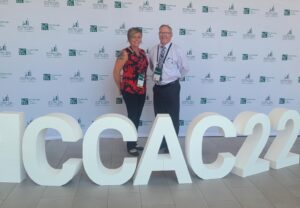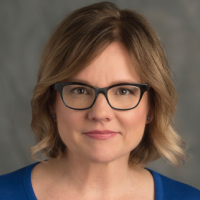
Code of Honor Scholarship Recipient Christina Selby Attends Her First Code Council Public Comment Hearings
Code Council 2022 Public Comment Hearings Takeaways: ESS, Solar Panels and More
Duncan, Oklahoma’s Commercial Applications Coordinator Christina Selby received an ICC Code of Honor scholarship to attend her first Code Council Public Comment Hearing, held in Louisville, Kentucky, this past September.
“The hearings were very eye-opening,” said Selby. “Not only are life and safety taken into account, but also record-keeping, administrative workloads, property owner expenses, geographical location, and more.” Selby drove almost 900 miles northeast to participate in the Code Council’s Annual Conference, and her inaugural event was an overview of the code development process, which she appreciated. “I felt at ease to know that there were so many others needing direction on what would be expected, and exactly how we were supposed to do it,” she said. Even though she had to stand in the back of the room, she felt like she belonged, noting that “these are my people!”
Exploring Topics in the Code Development Process

For day two, Selby loaded her notebook and laptop into her new Code Council swag bag and entered the hearings moderated by John Terry and previous mentor Alex “Cash” Olszowy, whom she enjoyed reconnecting with after 10 years. She remembers that the discussion centered around situations previously left to jurisdictions (or AHJ, Authority Having Jurisdiction) for interpretation, manufacturers for installation instructions, or individual states as it applies to the adoption of statewide minimal codes with or without amendments. She noted certain repeated phrases, such as “tweak” and “monkey wrench,” which short-hands the regular experiences of building code professionals.
Building Code Development Conferences Mirror Daily Building Code Discussions
“This conference is much like my day-to-day life,” Selby said. Every Tuesday, her land development application review committee meets to look at applications and plans that have been submitted and pre-reviewed. Sometimes they also invite builders, contractors and designers to join, making her feel like a mediator for professional disagreements. Selby realized that comment-hearing discussions are much like typical debates from those seeking permits, like property owners and engineers, where the burden of proof falls on the submitting party.
Although the codes are meant to work simultaneously, they can often conflict. Selby and another attendee from Plano, Texas, noted the absence of utility providers at the conference. “In Oklahoma and Texas, Code Council licensing stops at the sewer mains and water meters or property lines, depending on location,” she said. Anything beyond those points is regulated by the Department of Environmental Quality Water and Wastewater Divisions, which makes her think that some matters might be better left to a state or local adoption of minimal code provisions. “A code development that can fit 50 states, the District of Columbia, Puerto Rico, Guam, and the U.S. Virgin Islands must be unique for all adopting areas to be compliant with minimal amendment,” she said.
Building Code Inspectors Protect Human Lives
“As a building, plumbing and sanitation inspector, my main concern and primary scope is the safety of human lives,” Selby continued. “My clients are residents, community visitors, local business employees and customers, plus emergency responders. The changes made throughout these intense reviews could not only affect home and business owners, builders, engineers, designers and the general public, but might also impact the additional requirements imposed on states, jurisdictions, municipalities, building departments and code officials.”
During her long drive back home, Selby reviewed her primary conference takeaways from the 1,200 pages of proposed code development changes, including her gratitude that many presenters incorporated humor during the long discussion days. She also concluded that Oklahoma’s state code adoption process is usually a cycle behind the nation due to rapid changes in technology.
Code Council 2022 Public Comment Hearings Takeaways: ESS, Solar Panels and More
Selby noted that there were fewer participants for residential concerns than for commercial interests, and wonders if codes developed for business projects could be implemented in the private sector at a later date. Energy storage systems (ESS) are not big in her state, as Oklahoma is a large oil producer, but appreciated hearing about advances in heat, smoke and carbon dioxide detection, as well as garage storage fireproofing requirements.
As a building inspector, she was surprised that drinking fountain codes post-COVID weren’t discussed, noting that most bubblers around Oklahoma have been covered in trash bags, duct tape and “do not use” signs. Her state’s plan is to covert some water fountains into bottle fillers only, or to remove them entirely. She’s also hoping for more updates about cannabis codes, an industry that is now legal in 37 states but isn’t covered under pharmaceutical or alcohol considerations.
In addition, she wants to learn more about current standard operating procedures for solar panels as they relate to her work with the Duncan Fire Department. She’s looking to codify practices on panel walkways and clearances, as well as where firefighters can place ladders or cut a vent in a roof, knowing that what she learned at the hearings will “kick up some new conversations.”
The time and effort put into the code development process is “quite spectacular,” Selby noted. “Watching votes being cast is enlightening for a newbie.” She observed that when she was feeling 50/50 about a vote or felt extreme toward one direction or another, others felt similarly. She was impressed with the voting process, that the coordinators took into consideration the time and paperwork that new or augmented codes would add to a permit cycle. After years as a plumber, she always wondered how and why new laws were implemented, and recalls the biggest violation she regularly sees, that commercial toilets should have horseshoe (open front) lids, rather than the full circle type used in homes.
Building code development is a crucial industry underpinning, as many codes arise out of an injury incident, or even a death. As a valuable member of the trades at the comment hearings, Selby never felt like an outlier and is happy to represent and connect with women in a male-dominated field. She is proud to be among her code people.








